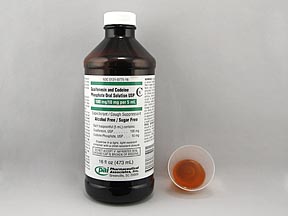
Guaifenesin-codeine Coupons & Savings Card – Discount Prices from $9.40
Generic for: Guaiatussin ac, Guaifenesin ac, Mar-cof cg expectorant
My prescription
Edit
118ML of 100-10MG/5ML, Guaifenesin-codeine (1 Bottle)
Select pharmacy

Walgreens
$9.40
COUPON PRICE
Albertsons
$10.19
COUPON PRICEGuaifenesin-codeine savings card
Show this card to your pharmacist
Walgreens
$9.40
BIN
ID
PCN
GRP
011867
LH049E5BDC
HT
LABH001
Powered by
More prescriptions for cough
More prescriptions for cough
Price history for Mar-cof Cg Expectorant (brand) & Guaifenesin-codeine (generic)
1 Bottle, 118ML of 100-10MG/5ML
Average retail price for Mar-cof Cg Expectorant
Average retail price for Guaifenesin-codeine
Average SaveHealth price for Guaifenesin-codeine
Our price history data is based on aggregated prescription data collected from participating pharmacies in America. Our prescription data updates daily to reflect the latest price changes. If you notice a missing data point, it means there wasn't sufficient data available to generate a monetary value for that date.
We analyzed Guaifenesin-codeine prices for (118ML of 100-10MG/5ML, 1 Bottle) over the last 12 months. The average retail price was $34.68, while the average price using the SaveHealth discount card was $7.34. That's a savings of approximately 78.84% when using our Guaifenesin-codeine coupon.
Compared to the generic version, Mar-cof Cg Expectorant had an average price of $83.99 over the same time period. With the SaveHealth savings card, Guaifenesin-codeine is 91.26% cheaper on average than Mar-cof Cg Expectorant.
*Retail prices are based on pharmacy claims data, and may not be accurate when we don't have enough claims.
Guaifenesin-codeine dosage forms
Dosage Quantity Price from Per unit 118ML of 100-10MG/5ML 1 Bottle $12.89 $12.89 118ML of 100-10MG/5ML 2 Bottles $16.79 $8.39 118ML of 100-10MG/5ML 3 Bottles $20.68 $6.89
| Dosage | Quantity | Price from | Per unit |
|---|---|---|---|
| 118ML of 100-10MG/5ML | 1 Bottle | $12.89 | $12.89 |
| 118ML of 100-10MG/5ML | 2 Bottles | $16.79 | $8.39 |
| 118ML of 100-10MG/5ML | 3 Bottles | $20.68 | $6.89 |
